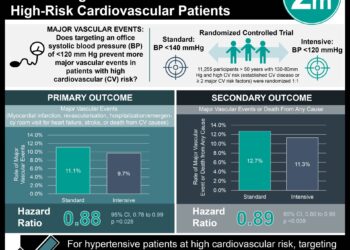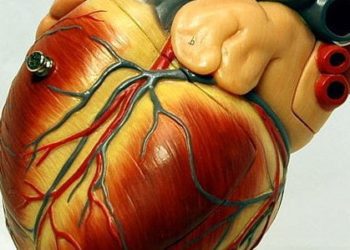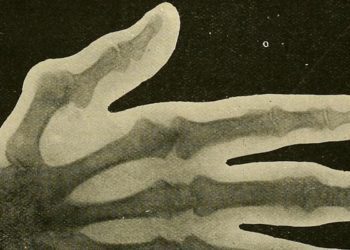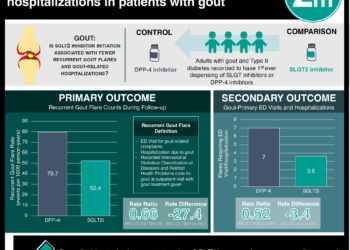Gout flares associated with a transient increase in subsequent risk of cardiovascular events
1. Amongst patients with gout, those who experienced a cardiovascular event were likely to have recently experienced a preceding gout flare.
2. The risk of experiencing a cardiovascular event was highest amongst individuals with a recent gout flare within 60 days.
Level of Evidence Rating: 2 (Good)
Study Rundown: Gout is a common inflammatory condition which is associated with an increased risk of cardiovascular events even in the absence of other cardiovascular risk factors. This relationship is important, as cardiovascular events are a leading cause of morbidity and mortality. This study sought to investigate the relationship between gout flares and cardiovascular events.
62,822 eligible patients were matched and analyzed in this nested case control study. Of these, 10,475 were cases and 52,347 were controls. The incidence of cardiovascular events in the study sample was 17.34 per 1000 person-years. Cases had a higher rate of cardiovascular risk factors at baseline than controls. A total of 44.9% of patients experienced a gout flare over the mean follow-up period (5.3 years); the proportion of patients experiencing a gout flare was similar between cases and controls. Patients with cardiovascular events had higher odds of having a gout flare within the prior 120 days, particularly within 60 days of the cardiovascular event.
This retrospective study by Cipolletta et al. concluded that amongst patients with gout who experience a cardiovascular event, the odds of having had a gout flare within the preceding months are significant. Clinically, a gout flare may be used as a predictor of cardiovascular events, and a point for early intervention. A strength of this study was the large sample size and clinical utility of the reported findings. However, these conclusions are limited by the retrospective nature of this data which may have failed to capture exposure data (i.e., interactions with the healthcare system were used as a proxy for diagnosed gout flares) as well as important data about outcomes (i.e., hemorrhagic vs. ischemic stroke were not differentiated despite differences in pathophysiology).
Click here to read this study in JAMA
Click to read an accompanying editorial in JAMA
Relevant reading: Dietary interventions for gout and effect on cardiovascular risk factors: a systematic review
In Depth [case-control study]: A retrospective, observational study was conducted using data from the Clinical Practice Research Databank in the United Kingdom. Patients aged 18 or older who were newly diagnosed with gout were included. Data from 1997 to 2020 were collected. Cases were individuals who had been diagnosed with a cardiovascular event: acute myocardial infarction or stroke. Up to 5 controls were assigned to each case. Gout flares were diagnosed through assessment of primary care and hospital records as well as diagnostic codes.
The incidence of cardiovascular events in the study sample was 17.34 per 1000 person-years (95% confidence interval 17.02-17.68). 49.2% of cases experienced acute myocardial infarction and 50.8% experienced stroke as their index cardiovascular event. 37.1% of cases experienced death secondary to a cardiovascular event (21.4% myocardial infarction, 15.8% stroke). Cases had a significantly higher burden of known risk factors than controls: current smoking (12.6% vs 8.9%), prior cardiovascular diseases (52.0% vs 20.7%), and a higher Charlson Comorbidity Index (mean [SD], 3.23 [2.28] vs 2.52 [2.18].
The adjusted odds ratio (aOR) for having a gout flare amongst individuals who had experienced a cardiovascular event were as follows: 0 to 60 days (2.0% vs 1.4%; aOR, 1.93 [95% confidence interval, 1.57-2.38]) and 61 to 120 days (1.6% vs 1.2%; aOR, 1.57 [1.26-1.96]). The odds ratio for a gout flare between 121-180 days was non-significant (1.06, 0.84-1.34).
Image: PD
©2022 2 Minute Medicine, Inc. All rights reserved. No works may be reproduced without expressed written consent from 2 Minute Medicine, Inc. Inquire about licensing here. No article should be construed as medical advice and is not intended as such by the authors or by 2 Minute Medicine, Inc.






![Carbon nanotubes ameliorate methamphetamine addiction in mice [PreClinical]](https://www.2minutemedicine.com/wp-content/uploads/2016/03/Blue_Crystal_Meth-75x75.jpg)
